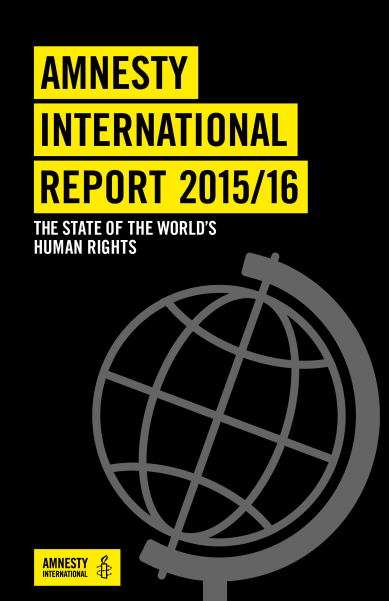
Amnesty International Report 2015/16: The State of the World’s Human Rights
Publication Year: 2016 / Sources: Amnesty InternationalThe Amnesty International Report 2015/16 documents the state of the world’s human rights during 2015 including five regional overviews and a survey of 160 countries and territories highlight the suffering endured by many, be it through conflict, displacement, discrimination or repression. In the Asia-Pacific region such as China, Cambodia and Vietnam…ect even as rapid social and economic change continued , the human rights situation often remained bleak
Download: English | Khmer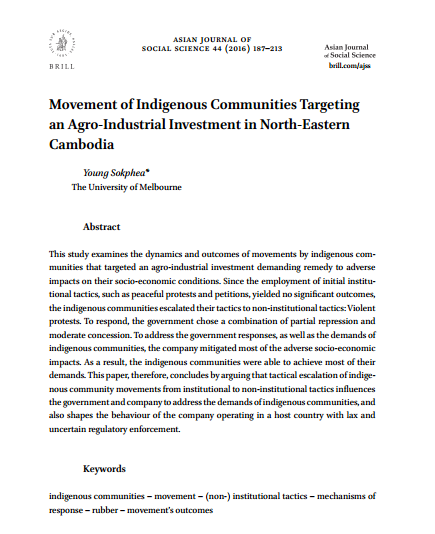
Movement of Indigenous Communities Targeting an Agro-industrial Investment in Northeastern Cambodia
Publication Year: 2016 / Sources: Asian Journal of Social ScienceThis study examines the dynamics and outcomes of movements by indigenous communities which targeted an agro-industrial investment demanding remedy to adverse impacts on their socioeconomic conditions. Since the employment of initial institutional tactics, such as peaceful protests and petitions, yielded no significant outcomes, the indigenous communities escalated their tactics to non-institutional tactics: violent protests.
Download: English | Khmer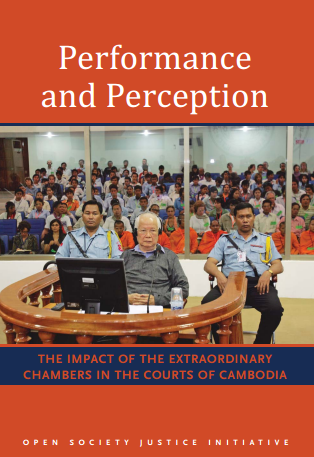
Performance and Perception: The Impact of the Extraordinary Chambers in the Courts of Cambodia
Publication Year: 2016 / Sources: Open Society FoundationsThis report attempts to examine both how the ECCC has performed, and how Cambodians perceive its performance. It seeks first to analyze the ECCC’s record to date in meeting its primary goal of providing justice to the victims of the KR by establishing credible accountability for the highest level perpetrators and thus ending impunity for the worst crimes of the KR. Second, this report examines the court’s record in meeting its secondary goals of contributing to an improved domestic justice system, healing and reconciliation for victims and perpetrators, and a better general understanding of what happened during the KR regime.
Download: English | Khmer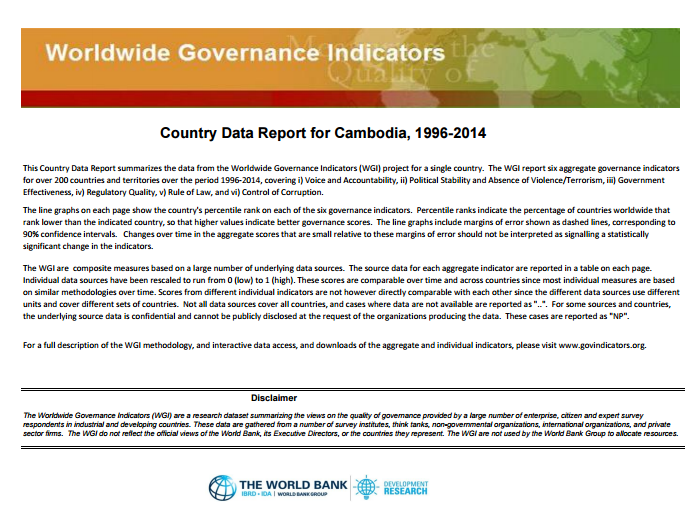
Worldwide Governance Indicators: Country Data Report for Cambodia, 1996-2014
Publication Year: 2015 / Sources: The World Bank group (Worldwide Governance Indicators)The Worldwide Governance Indicators (WGI) project reports aggregate and individual governance indicators for 215 economies over the period 1996–2014, for six dimensions of governance: Voice and Accountability; Political Stability and Absence of Violence; Government Effectiveness; Regulatory Quality; Rule of Law; Control of Corruption.
Download: English | Khmer
Corruption perceptions index 2015 – Asia Pacific
Publication Year: 2016 / Sources: Transparency InternationalThe 2015 Corruption Perceptions Index measures the perceived levels of public sector corruption in 168 countries/territories around the world.
Download: English | Khmer
Corruption Perceptions Index 2015
Publication Year: 2016 / Sources: Transparency InternationalBased on expert opinion from around the world, the Corruption Perceptions Index measures the perceived levels of public sector corruption worldwide. Not one of the 168 countries assessed in the 2015 index gets a perfect score and two-thirds score below 50, on a scale from 0 (highly corrupt) to 100 (very clean). More than 6 billion people live in a country with a serious corruption problem.
Download: English | Khmer
Democracy Index 2015: Democracy in an Age of Anxiety
Publication Year: 2016 / Sources: The Economist Intelligence Unit (EIU)The Economist Intelligence Unit’s Democracy Index provides a snapshot of the state of democracy worldwide for 165 independent states and two territories—this covers almost the entire population of the world and the vast majority of the world’s states (micro-states are excluded). The Democracy Index is based on five categories: electoral process and pluralism; civil liberties; the functioning of government; political participation; and political culture.
Download: English | Khmer
Should Convicted Foreign Child Sex Offenders Be Deported from Cambodia?
Publication Year: 2015 / Sources: Action pour les Enfants (APLE Cambodia)Criminal deportation refers to the situation in which an individual is ordered or transported out of a state as a result of a criminal conviction. While in multiple countries the number of criminal deportations is rising exponentially, still less than one in three convicted foreign child sex offenders are ordered to be deported from Cambodia after finishing their sentence. Little is known about judges’ motivations behind deportation orders or the absence thereof.
Download: English | Khmer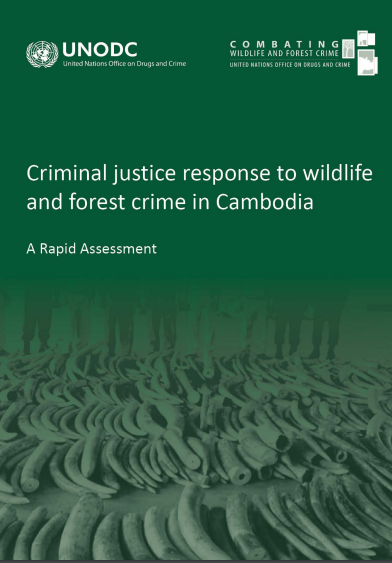
Criminal Justice Response to Wildlife and Forest Crime in Cambodia
Publication Year: 2015 / Sources: United Nations Office on Drugs and Crime (UNODC)It is not only Cambodia’s forests that have been exploited. Many of Cambodia’s fauna species have also been targeted and continue to be subjected to illegal trafficking to feed markets in China and Vietnam. Recent seizures point to transnational organised crime groups targeting Cambodia as a transit point for ivory and rhino horn from Africa. The objective of this study therefore is to determine what role the criminal justice system in Cambodia plays in combating the illegal trade in timber and wildlife.
Download: English | Khmer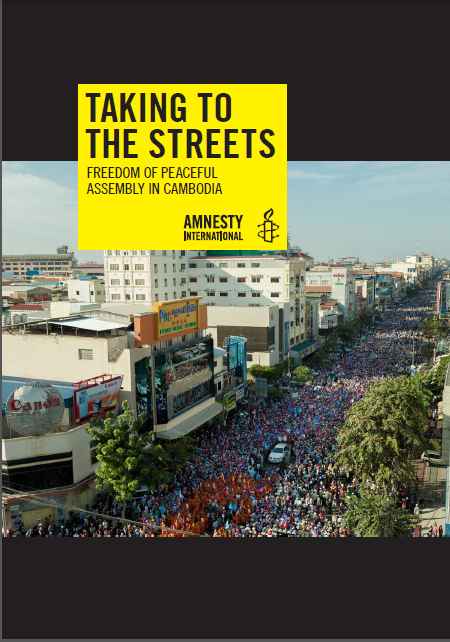
Taking to the Streets: Freedom of Peaceful Assembly in Cambodia
Publication Year: 2015 / Sources: Amnesty InternationalThe report reveals a pattern of violations: the imposition of arbitrary restrictions on freedom of peaceful assembly; the unnecessary and excessive use of force by security forces policing assemblies; a culture of impunity surrounding human rights violations committed in the context of assemblies; and the use of the judiciary to harass those who organize and participate in assemblies.
Download: English | Khmer